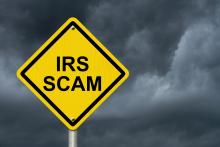
Criminals are hard at work trying to steal money being sent to taxpayers under the federal CARES Act. The Internal Revenue Service (IRS) is urging taxpayers to be on the lookout for a surge of fraudulent calls and email phishing attempts related to the Coronavirus, or COVID-19. Taxpayers should watch out not only for phishing emails but also text messages, websites and social media attempts that request money or personal information.
Here are important things to know:
- The IRS will never call you asking to verify or provide your financial information so you can get an economic impact payment or your refund faster.
- That also applies to surprise emails that appear to be coming from the IRS. Remember, don't open them or click on attachments or links. Go to IRS.gov for the most up-to-date information.
- In most cases, the IRS will deposit economic impact payments into the direct deposit account taxpayers previously provided on tax returns. If the IRS does not have a taxpayer's direct deposit information, a check will be mailed to the address on file. Taxpayers should not provide their direct deposit or other banking information for others to input on their behalf into the secure portal.
- The IRS also reminds retirees who don't normally have a requirement to file a tax return that no action on their part is needed to receive their economic impact payment.
Reporting Coronavirus-related or other phishing attempts
Unsolicited emails and text messages that appear to be from either the IRS or an organization closely linked to the IRS should forward it to phishing@irs.gov.
Taxpayers are encouraged not to engage potential scammers online or on the phone. Learn more about reporting suspected scams by going to the Report Phishing and Online Scams page on IRS.gov.
